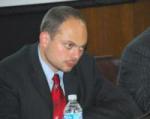
On Monday morning, armed police broke into the Moscow apartments of several opposition leaders, civic activists, and media personalities who were among the organizers of the anti-Putin protests that swept through Russia since last December’s rigged parliamentary elections. Investigators spent hours plowing through the personal belongings of Alexei Navalny, Sergei Udaltsov, Ilya Yashin, Ksenia Sobchak, and other opposition figures, confiscating their computers, phones, flash drives, printed materials, clothes—even family photographs and children’s cartoons. The parents of some pro-democracy campaigners also had their houses searched. Police detained a number of activists and surrounded the offices of RosPil, an anticorruption watchdog run by Navalny. For the entire day, riot police stood guard by the apartment of former Deputy Prime Minister Boris Nemtsov, who had managed to leave before they arrived (his apartment was searched—and computers confiscated—on Tuesday).
According to Major General Vladimir Markin, the spokesman for Russia’s Investigative Committee, the raids, conducted in connection with “disturbances” at the May 6th anti-inauguration protest, resulted in the seizure of materials “directed against the state” (sic). Opposition leaders were handed summons to appear for questioning at eleven o’clock on Tuesday—one hour before the start of the planned anti-Putin march in central Moscow. Law enforcement agencies should be commended for their zeal: June 12th, the anniversary of Russia’s 1990 declaration of sovereignty from the USSR, is a national holiday, when all government agencies are normally closed.
The raids, already compared to the nighttime arrests of Stalin’s 1937 Great Purge, were evidently designed to scare off Muscovites from participating in Tuesday’s march. As, indeed, was the hastily adopted law on public rallies, which raised fines for “violations” on individual participants to 300,000 rubles ($9,000; ten times Russia’s average monthly salary). Neither trick has succeeded. Between 50,000 and 100,000 people marched from Pushkinskaya Square to Sakharov Avenue in a show of support for the opposition. Among the chants of “Russia Without Putin” and “Putin is a Thief,” the protesters adopted the “Manifesto of a Free Russia,” a unifying program for the country’s diverse pro-democracy movement that calls for Putin’s immediate resignation, new free and fair legislative and presidential elections, and the adoption of a new Constitution with a much-strengthened Parliament. “They tried to frighten us, they tried to make sure that you did not come here,” declared Nemtsov, who was presented with a summons to the Investigate Committee as he walked onto the speakers’ platform. “But you came, because they cannot frighten us. It is they who are frightened of us as they are of fire; they are frightened of a popular protest, of independent and proud people.”
Authoritarian regimes, especially as they near the end, often lose touch with reality. If recent history is any indicator, desperate attempts to preserve control and beat down opponents with increased crackdowns rarely serve their purpose. Indeed, they usually hasten the downfall.
Vladimir Kara-Murza's blog is here:
http://www.worldaffairsjournal...

























